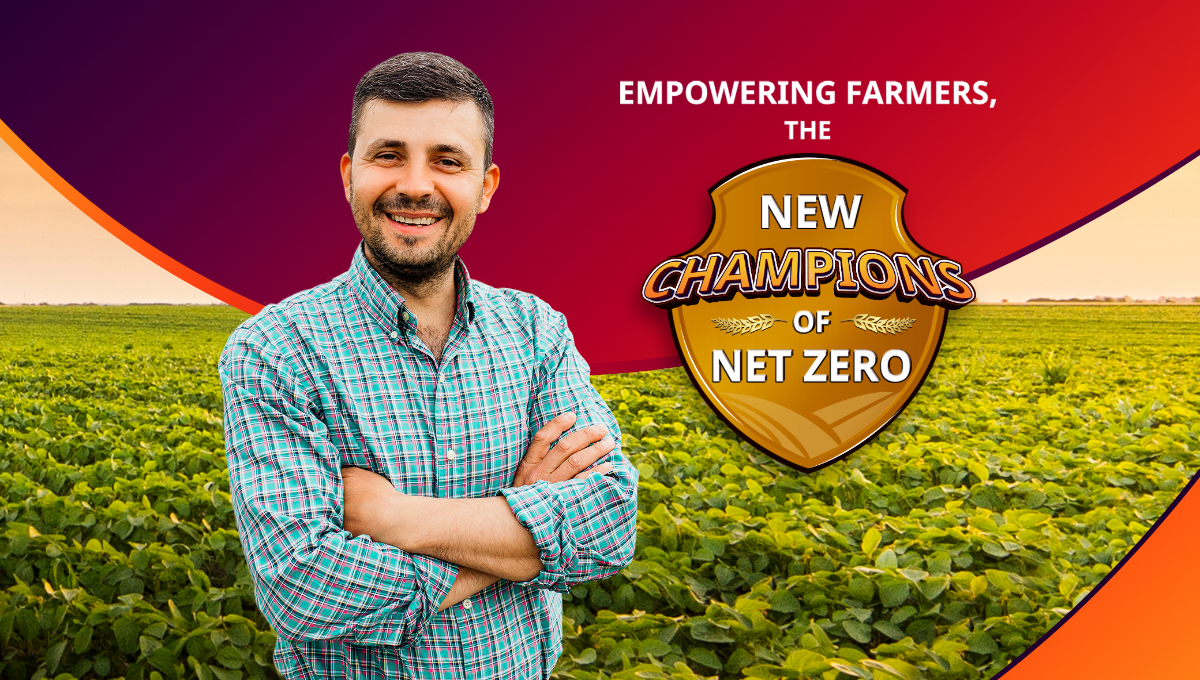As part of our One Goal campaign in support of the FIFA World Cup Qatar 2022™, we’re looking at some of the ways UPL is Reimagining Sustainability for the world’s farms and food systems, and some of the exciting – and often unappreciated – ways that farmers can reshape the climate conversation as the new champions of our net-zero future.
UPL is a trusted partner to large and small farmers all over the world, and the closeness of this relationship goes back to the earliest days of our business. When we began our work more than 50 years ago, we were quick to recognise that in most instances, innovation and technology were most effective when matched with farmers’ circumstances, environment, and needs. We still listen to, and learn from, farmers every day and this approach has taken on even greater significance as we work to empower many of the world’s 580 million small farmers as the new heroes of decarbonisation.
Empowering farmers not only means rethinking the role of farming, but also asking how world agriculture can be transformed so that it contributes to a healthier planet. This is where decarbonisation – or removing and trapping the greenhouse gases such as methane and carbon dioxide that contribute to global warming – comes in. Last year, UPL and our partners at the FIFA Foundation announced a commitment to sequester a gigaton of carbon by 2040 – that’s 1,000,000,000 tonnes, or the equivalent mass of all mammals in the world except for humans. Why? Because we recognise that reaching net-zero is one of the most important goals against climate change, and we believe that farming has a vital role to play. Reimagining Sustainability means farmers are part of the carbon solution, part of the global development story, and part of a new future for food systems worldwide.
With the eyes of the world on the World Cup, we want to invite everyone to reconsider agriculture as one of the greatest and most under-utilised resources in global efforts to mitigate the risks posed by a changing climate and improve the health of ecosystems worldwide. Take soil as an example: with the right practices, agricultural land alone has the potential to store up to 1.2 billion tons of carbon – or 10% of the carbon reduction needed to avoid breaching the catastrophic 1.5-degree* global warming barrier.
So, in the same way the top football teams have the best coaches, boots, and training grounds, we want to show how farmers, empowered with the right tools, technologies, and support – can be the new heroes of net zero. This is all part of our OpenAg purpose, because we are not just talking about the role of farmers as climate champions, but working hand-in-hand with them to grow a new global ecosystem. One which not only incentivises change but empowers it, equipping farmers to adopt sustainable agricultural practices and then rewarding each with carbon credits for doing so.
We call it the Gigaton Carbon Goal by OpenAg, and while it may start with a commitment to sequester a billion tonnes of carbon by 2040, it’s also a chance to do things differently. We’re creating a new approach to soil-carbon sequestration, one that responds to the needs of individual farmers and individual environments while still contributing to a shared purpose. For each country and each crop, our Gigaton Carbon Goal brings together a new ecosystem of technologies, interventions, research institutions, and financial products to incentivise, empower and reward individual farmers for their efforts to capture carbon. And we’re well underway! Our pilot phase for the Gigaton Carbon Goal is already being rolled out with farmers in Chile and Brazil, and by 2040 it will encompass the equivalent of 100 million hectares – that’s almost 40 million soccer fields – around the world.
But 100 million hectares and 1 billion tonnes of carbon represent a significant challenge, so how are we going to meet it? We’re going to carry on doing what we know best: We’re going to be listening to the needs of farmers, using our resources, footprint, and experience to identify and invest in the tools, techniques and technologies that can help equip and empower every farmer on their own carbon journey – just as we have done ever since UPL first started out.
One way we are doing this is through the launch of UPL’s Radicle Carbon & Soil Challenge, the first global competition of its kind for seeking and scaling soil-carbon technologies. Through the Radicle Challenge, we’re investing in and scaling a number of innovative climate-positive agricultural technologies that we believe are additional tools that will help farmers secure our global food future.
Reimagining Sustainability is a commitment to revealing the extraordinary potential for agriculture in sustainable development. Decarbonisation is one of the ways we can ensure that agriculture continues to be force for good, feeding the planet and sustaining it at the same time. The journey to Doha gives us an extraordinary opportunity to tell this story to the world, and we are grateful to be working closely with our partners at The FIFA Foundation have given to the Gigaton Carbon Goal to ensure that the impact of this story extends well beyond the World Cup.
These are just a few of the exciting ways that UPL is changing the game for world farming. In the weeks and months ahead, we’ll be sharing some of our the most innovative and impactful interventions from across UPL’s global footprint, inviting the world to participate in our story and explore the incredible ways in which farmers are becoming the real champions of climate change and our net-zero future.
*Source: Glasgow Climate Pact, https://unfccc.int/documents/
